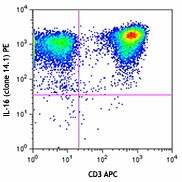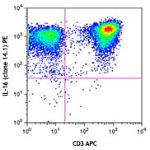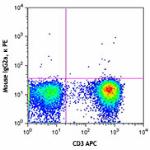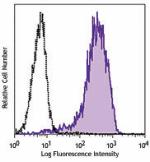- Clone
- 14.1 (See other available formats)
- Regulatory Status
- RUO
- Other Names
- Interleukin-16
- Isotype
- Mouse IgG2a
- Ave. Rating
- Submit a Review
- Product Citations
- publications

-

Human peripheral blood lymphocytes were surface stained with CD3 APC, and then fixed, permeabilized, and stained with IL-16 (clone 14.1) PE (top) or mouse IgG2a, κ PE (bottom). -

| Cat # | Size | Price | Quantity Check Availability | Save | ||
|---|---|---|---|---|---|---|
| 519106 | 100 tests | £205 | ||||
Interleukin-16 is a proinflammatory cytokine synthesized as a 68 kD precursor molecule (pro-IL-16). After cleavage of pro-IL-16 by caspase-3, IL-16 is released as a 12 kD protein, but its biologic activities are exerted by a tetramer. IL-16 is a chemoattractant for CD4+ T cells, monocytes, and eosinophils. On T cells, IL-16 upregulates CD25 and class II expression, and also inhibits HIV-1 replication in vitro by repressing the transcription of the HIV-1 long terminal repeat. IL-16 is expressed by lymphocytes, macrophages, eosinophils, mast cells, epithelial cells, and fibroblasts. CD4 and CD9 are the receptors of IL-16.
Product DetailsProduct Details
- Verified Reactivity
- Human
- Reported Reactivity
- Mouse
- Antibody Type
- Monoclonal
- Host Species
- Mouse
- Immunogen
- Peptide corresponding to amino acids 615 to 630 (RRKSLQSKETTAAGDS) of IL-16
- Formulation
- Phosphate-buffered solution, pH 7.2, containing 0.09% sodium azide and BSA (origin USA)
- Preparation
- The antibody was purified by affinity chromatography and conjugated with PE under optimal conditions.
- Concentration
- Lot-specific (to obtain lot-specific concentration and expiration, please enter the lot number in our Certificate of Analysis online tool.)
- Storage & Handling
- The antibody solution should be stored undiluted between 2°C and 8°C, and protected from prolonged exposure to light. Do not freeze.
- Application
-
ICFC - Quality tested
- Recommended Usage
-
Each lot of this antibody is quality control tested by intracellular immunofluorescent staining with flow cytometric analysis. For flow cytometric staining, the suggested use of this reagent is 5 µl per million cells in 100 µl staining volume or 5 µl per 100 µl of whole blood.
- Excitation Laser
-
Blue Laser (488 nm)
Green Laser (532 nm)/Yellow-Green Laser (561 nm)
- Application Notes
-
Additional reported applications (for the relevant formats) include: ELISA2, inhibition of T cell chemotaxis2 and immunohistochemical staining of frozen lymph node sections3.
-
Application References
(PubMed link indicates BioLegend citation) -
- Cruikshank WW, et al. 1994. P. Natl Acad Sci USA 91:5109. (ICFC)
- Keane J, et al. 1998. J. Immunol. 160:5945. (Block, ELISA)
- Chupp GL, et al. 1998. J. Immunol. 161:3114. (Block, IHC)
- Stoitzner P, et al. 2001. J. Invest. Dermatol. 116:641. (ICFC)
- Ren F, et al. 2005. J. Immunol. 174:2738. (ICFC)
- Product Citations
-
- RRID
-
AB_10897940 (BioLegend Cat. No. 519106)
Antigen Details
- Structure
- 12 kD protein with a PDZ domain, product of the cleavage of pro-IL-16 by caspase-3, forms tetramers.
- Distribution
-
Lymphocytes, macrophages, eosinophils, mast cells, epithelial cells, and fibroblasts.
- Function
- Chemoattractant for CD4+ T cells, monocytes, and eosinophils. Upregulates CD25 and class II expression on T cells. Inhibits HIV-1 replication.
- Ligand/Receptor
- CD4.
- Cell Type
- Eosinophils, Epithelial cells, Fibroblasts, Lymphocytes, Macrophages, Mast cells, Tregs
- Biology Area
- Immunology, Innate Immunity
- Molecular Family
- Cytokines/Chemokines
- Antigen References
-
1. Bellon M, et al. 2010. Blood 115:2441.
2. Rofani C, et al. 2009. Stem Cells Dev. 18:671.
3. Cruikshank W and Little F. 2008. Crit. Rev. Immunol. 28:467.
4. Gu Y, et al. 2008. J. Immunol. 181:4418.
5. McFadden C, et al. 2007. J. Immunol. 179:6439.
6. Qi JC, et al. 2006. Blood 107:135. - Gene ID
- 3603 View all products for this Gene ID
- UniProt
- View information about IL-16 on UniProt.org
Related FAQs
- What type of PE do you use in your conjugates?
- We use R-PE in our conjugates.
Other Formats
View All IL-16 Reagents Request Custom Conjugation| Description | Clone | Applications |
|---|---|---|
| PE anti-human IL-16 | 14.1 | ICFC |
| Purified anti-human IL-16 | 14.1 | ICFC,ELISA,IHC-F,Block |
| Ultra-LEAF™ Purified anti-human IL-16 | 14.1 | ICFC |
Compare Data Across All Formats
This data display is provided for general comparisons between formats.
Your actual data may vary due to variations in samples, target cells, instruments and their settings, staining conditions, and other factors.
If you need assistance with selecting the best format contact our expert technical support team.
-
PE anti-human IL-16

Human peripheral blood lymphocytes were surface stained with... 
-
Purified anti-human IL-16
-
Ultra-LEAF™ Purified anti-human IL-16

Human peripheral blood lymphocytes were fixed, permeabilized...
 Login / Register
Login / Register 














Follow Us